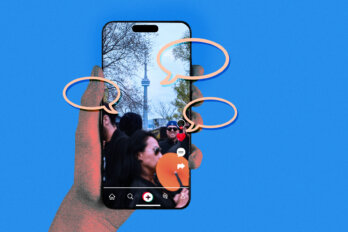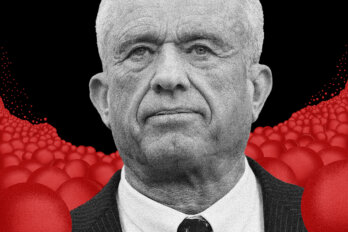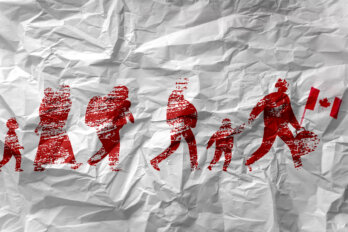As a twenty-nine-year-old woman nearing the end of my first pregnancy in January 2018, I had several fears to keep me company while I got up six times a night to pee. There was the fear of labour, of course. My pain threshold had never been tested by anything worse than food poisoning, and the last chapters of the pregnancy books on my nightstand were making me squeamish. I can hardly hear the word cartilage without cringing. How would I stand up to the violence of childbirth?
I was also afraid that my husband and I were in over our heads. We were both in the habit of pouring all our waking hours, and some of our sleeping ones, into our beverage business, which we founded with friends in 2014. Four years in, the company was everything we did and most of who we were: we had opened sixteen shops and an overnight delivery service, built a state-of-the-art manufacturing facility, published a cookbook, and recruited a hardworking team of around 100 people. With national expansion on the horizon, we knew the next two years would be our most intense yet. We were afraid that a having a baby right now was an absurd and even reckless idea.
And, related to that, a more private and somewhat less rational fear: What if, thanks to my superior milk-production equipment, I got permanently sucked into a role I had grown up thinking I would hate—that of full-time mum? It suddenly seemed plausible that I might slip down the hormonal rabbit hole of early motherhood only to wake up one day and discover that my career had left me behind. I was afraid of being not only isolated but trapped and resentful. My sense of self had always been tied to what I accomplished; I was afraid of losing my identity.
Ten days before my due date, while my belly and I were navigating a crowded party, a family friend gave me some advice. Pregnant ladies are famous for being advice magnets, attracting useful, graphic, and puzzling bits of counsel every time they leave the house: go to the movies right now, while you still can; slather Vaseline on your baby’s bum so the meconium doesn’t stick; don’t listen to advice of any kind. But I held on to my friend’s wisdom. “The early months with your first child only happen once,” they said. “So pay attention. Don’t spend them scrolling through your phone.”
Trying to reconcile this advice with my naive hope that as soon as I’d physically recovered I’d be able to begin carrying my weight at work again was complicated. My due date was a Saturday; I had decided to stop working the Friday evening. My company’s marketing team was prepared to continue on without me, but I secretly hoped that I’d be back at work within a few weeks. When one of my colleagues, a senior executive and the mother of two, asked how much time I planned to take off, I didn’t know what to answer. “It depends how self-sufficient the baby is,” I semi-joked. She smiled at me with kind eyes that said, “You have no idea what you’re in for, do you?”
Our daughter, Esmé, was born in a bathtub in downtown Toronto on a Thursday morning—two days early. At 1 a.m., my husband and I had left our office for the night and driven home through the snow. At 2 a.m., he was sending emails from bed when I felt something new and flipped to the dreaded back pages of my pregnancy books. By 3 a.m., he was timing my contractions with an app. Soon afterwards, our midwife arrived, and by the time an orange sun was breaking through the clouds, she was tossing homeopathic sugar pills onto my tongue and telling me that if I still wanted to deliver at the hospital—home of the drugs—it was now or never.
I couldn’t face getting down the stairs and into the car, so I got into the bath instead. Within minutes, “active labour” started, and what I had previously thought of as a ten out of ten on the pain scale turned out to have been closer to a two. I asked for a Tylenol, which got a big laugh from my midwife. Apparently, Tylenol is no match for active labour. At 10:13 a.m., I became a mother.
Following instincts I didn’t know I had, I went on to confine myself to the third floor of our house for a week. My world shrank and expanded immeasurably at the same time. The minute-by-minute needs of the small person lying on my chest were the only signals I heard. Our families made this possible. They came bearing food, fresh pyjamas, and a new kettle. They shovelled the walk and made tea with honey and oatmeal-date cookies. We ate minestrone on a tablecloth on the floor. I was hot all the time and raw from nursing. If it hadn’t been for our families, I would have crashed and burned. With their help, I was euphoric.
A few hours after Esmé was born, my husband had to go to a meeting. He hated to leave, but he had no choice. She was early; we hadn’t cleared our schedules. On day five of my voluntary confinement, I became aware that the deadline for the last item of business I had planned to accomplish before giving birth was upon me. I brought my laptop into bed and typed with one arm. What normally would have taken one hour took seven. My daughter was not impressed. She could sense it every time my attention strayed from her, and she used her significant vocal powers to bring it back. I wasn’t yet fluent in newborn, but it sounded as if she were telling me that I was going to have to choose: business or baby.
Meanwhile, my husband’s schedule never let up. He brought me breakfast in bed while it was still dark out, following my elaborate porridge-making instructions, then served me special tea from the health-food store that’s supposed to help stimulate breast-milk production. After that, he went to work. Our lives had changed completely, but the world outside my third-floor nest was the same as before. It was clear that we needed to divide and conquer. For now, our daughter would be my priority, and our business would be my husband’s. But, instead of feeling trapped, as I’d expected, I felt the kind of half-guilt you feel when you take the last seat on the streetcar or the biggest slice of cake.
Now three months old, Esmé is perfect in every way, but I wouldn’t quite call her self-sufficient. I’m still her only food source, and she eats about as frequently as an Olympic swimmer. Our days are shaped by the circuit training of feeding, burping, changing, dancing around for a bit, and then trying to figure out what to do with myself, one-handed, in the ten-minute to two-hour interval until she wakes up. I realize that, from out an outside perspective—mine, before she was born, for example—it may look like I am very much trapped. But, from inside the rabbit hole, these days are a choice and a privilege.
It’s not always blissful, of course. While the weeks are short, there are long, loud hours that seem to belong to a bottomless sea of long, loud, lonely hours. Isolation sneaks up on me: on a Sunday evening when every car that slows down on our street sounds like ours but isn’t and at dinnertime on a weeknight when she has been screaming like a tortured cat for an hour, and in my weakened state, I fall prey to that clichéd belief that I might be doing it all wrong.
But here’s the thing: it never gets boring. As one new father said to me recently, while staring at his son: “It’s like looking at fire.” And it’s true. Esmé is growing before my eyes like a stalk of bamboo. When serenity begins to elude me, I remember the advice I was offered at that party, and I put it to use. I now understand the urgency of paying attention—it is how I maintain control whenever the isolation threatens to hold me under.
The best way for me to pay attention is to go for a walk. Exploring my surroundings has been one of my standby isolation remedies since I was a teenager. In getting a bit lost (a skill that comes naturally to me), I try to find some perspective. I did it when my dad lived in New York after my parents’ divorce and I spent a March break wandering the streets while he worked. I did it when I first moved to Buenos Aires and my Spanish wasn’t good enough to get a SIM card. I did it in Paris where, over three years of Sundays and Augusts, I learned to be alone.
Our first walk, with my husband on Esmé’s one-week birthday, was tentative. She was very small, and it was sunny but cold. I worried about her cheeks. She fit into a kangaroo pouch made from a long piece of beige jersey tied up in intricate knots. I zipped us both into my roomy winter coat. Treading slowly across the icy sidewalk, we made it to the closest coffee shop to our house, which also happens to serve tattoos. Not keen on needles, I waited outside in a patch of sunlight while my husband brought out a decaf latte.
On her two-week birthday we ventured to a doughnut shop, just the two of us, where we celebrated with more decaf and an old fashioned doughnut. Her toque stuck up under my chin, and her face was smushed against my collarbone. I kept stopping to make sure she was breathing. At three weeks, we were picking up a few groceries. “Is that a baby in there?” the butcher asked me as I stocked up on thirty-minutes-at-350-degrees mac and cheese. “I need to give you a steak!” And he did.
During these walks, I learned that while motherhood can be isolating, it can be profoundly connecting as well. With my daughter strapped to my chest, I feel a part of something greater than the two of us. Her protruding toque invites warm smiles, open doors, and a force field of protectiveness and goodwill. On our first subway ride, no fewer than five passengers offered us their seats. They say it takes a village to raise a child—that afternoon it seemed the entire city of Toronto was pitching in.
By six weeks, we no longer needed a destination; we just walked. It was still cold, but she was getting heartier, and I was getting less paranoid. Aimlessness gave me a new lens: I examined houses, trees, graffiti, and litter as if looking for anthropological clues. Toronto is a new city to me now. It is the city my daughter will grow up in.
Thinking about how I’ll later describe the world to her, when she’s older and can understand my words, I notice that our neighbourhood’s Victorian houses are like aging film stars, still glamorous, with excellent bone structure. About one in five porches still wear vestiges of Christmas finery in mid-March, as if they are reluctant to admit that the party is over. One window asks for an end to tyranny, and a lawn sign demands “Cash4Labs.” Mailboxes, it turns out, are often “fed up.” Tim Hortons cups are everywhere, in varying stages of decay, not all of their rims rolled up.
One day, we stop at a convenience store to draw money from an ATM. Its keeper insists on holding the door, asks if, perhaps, I am the woman with a baby who recently left her scarf behind. I shake my head. It’s my first visit. “I love babies,” she beams toward the toque poking out of my coat. I unzip it slightly, showing off Esmé’s sleeping profile.
“I had three miscarriages,” she tells me suddenly. “I married late. The doctor told me to stop trying. The third one was with me for three months. On the wrong side.” She puts her hand on the right side of her abdomen. “I wanted to keep it, but the doctor said I couldn’t, it would be dangerous.”
The injustice of my unexpected pregnancy and healthy daughter overwhelms me. I am on the verge of tears. “I was just going to get a coffee across the street. Can I get you one?” I offer pathetically, as if this might help.
She smiles at me. “No, thanks. I love babies,” she repeats, looking once more at the bundle on my chest.
“We’ll visit often,” I say. I haven’t yet lived up to my word.
Across the street from the convenience store, there is a café with a Montaigne quote on the sandwich board out front: “Nothing is so firmly believed as that which we least know.” Though he was adamant that he could speak only for himself, the French essayist Michel de Montaigne remains, nearly 500 years later, an excellent shrink. Coincidentally, my mum and I have been reading Montaigne’s essays aloud lately—partly to help us pay attention and partly so my daughter doesn’t feel left out. “The most certain sign of wisdom is cheerfulness,” I recently announced in our sunlit sitting room, balancing the doorstopper of his Complete Works on my knee. And later: “My art and profession is to live.”
As Montaigne figured out long ago, the most universal parts of the human experience are often also the most personal. And so we can feel isolated in fear, in loss, in early parenthood—trapped inside our subjectivity. To escape, it’s on us to open the door.
On the way home from the café that day, as we walk past a dispensary that looks like it could be a daycare, a unisex hair salon with handwritten prices in the window, a Shoppers Drug Mart, and several Tibetan restaurants, I drink my coffee and describe the sights to my sleeping daughter by muttering into my coat. I realize that I can expand my identity to include a new role: that of my daughter’s tour guide on this journey into a world that will soon be hers.
“Enjoy your life,” advises a lime-green dumpster on a neighbour’s lawn, in powder-pink spray paint and punctuated by cheerful hearts. Garbage advice, perhaps, but I’ll take it.




